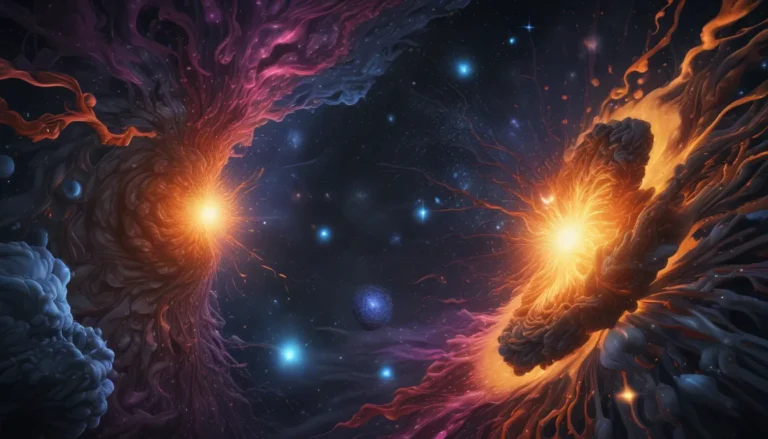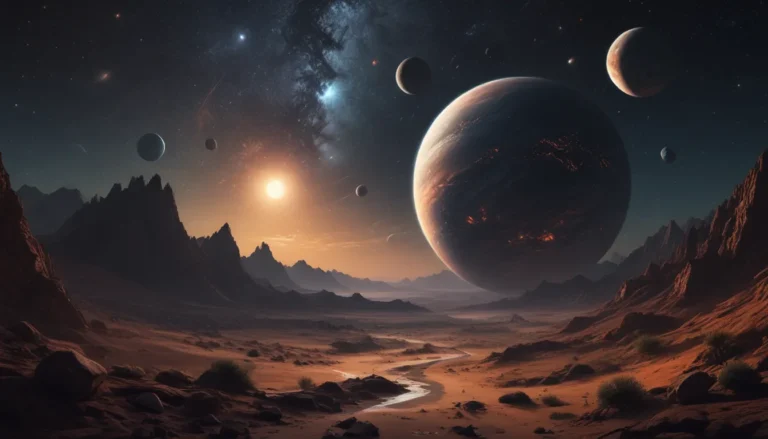The pictures we use in our articles might not show exactly what the words say. We choose these pictures to make you interested in reading more. The pictures work together with the words but don’t take their place. The words still tell you the important facts.
Space biology is a captivating field that delves into the impact of outer space conditions on living organisms, offering a unique perspective on the potential for life beyond Earth. As humans push the boundaries of space exploration, understanding the intricacies of space biology becomes increasingly vital. From the effects of zero gravity on the human body to the resilience of microorganisms in harsh space conditions, space biology sheds light on the possibilities of life existing beyond our planet.
Exploring the Marvels of Space Biology
In this article, we will embark on a journey through 13 astonishing facts about space biology that showcase the remarkable discoveries and ongoing research in this field. Whether it's unraveling the mysteries of plant growth in space or studying the adaptation of microorganisms to extreme conditions, space biology offers valuable insights into the potential for life beyond Earth and opens up exciting possibilities for future space exploration.
Unveiling Key Insights of Space Biology
- Space biology reveals how living in space impacts the human body, plants, and microorganisms, essential for the success of future space missions and astronaut well-being.
- Living in space poses unique challenges such as bone loss, altered immune systems, and disrupted sleep patterns, prompting scientists to develop solutions for astronauts on long missions.
The Human Body’s Transformations in Space
In the microgravity environment of space, the human body undergoes significant changes. Muscles and bones lose mass and strength due to reduced physical activity and lack of gravity. Additionally, fluid movement towards the upper body leads to a distinct physical change in astronauts during extended space missions.
The Thriving Power of Plants in Space
Contrary to common belief, plants can thrive in space. NASA has successfully grown various plants aboard the International Space Station, including lettuce, zinnias, and flowers. This achievement is crucial for sustaining long-duration missions by providing fresh food, recycling air, and boosting astronauts' psychological well-being.
Resilience of Microorganisms in Space
Microorganisms, including bacteria, fungi, and viruses, exhibit remarkable survival capabilities in the harsh conditions of space. Some studies show that bacteria can endure the vacuum of space, extreme temperatures, and high radiation levels, offering insights into potential life beyond Earth.
Immune System Challenges in Space Travel
Extended space travel can alter the human immune system, making astronauts more susceptible to infections. Understanding these immune system changes is essential for developing countermeasures to protect astronauts during long-duration missions.
DNA Vulnerability to Space Radiation
Space radiation, such as cosmic rays and solar flares, poses a significant risk to astronauts by damaging DNA and increasing the risk of health problems like cancer. Understanding the impact of space radiation on DNA is crucial for mitigating risks and ensuring the safety of space travelers.
Battling Bone Loss in Space
Living in a microgravity environment accelerates bone loss in astronauts, leading to space osteoporosis. Targeted exercise and nutrition interventions are necessary to counteract this phenomenon and minimize bone loss during long-duration missions.
Cardiovascular System Adaptations in Space
The cardiovascular system undergoes notable changes in space due to the absence of gravity, causing fluid shifts in the body and alterations in heart mass and blood vessel function. Understanding these changes is crucial for astronaut health and the development of appropriate countermeasures.
Genomic Adaptations in Microgravity
Gene expression in astronauts is altered in space, leading to physiological and metabolic adaptations. Studying these changes can provide valuable insights into health issues related to space travel and support astronauts' well-being.
The Impact of Space on Sleep Patterns
Astronauts aboard space vehicles often experience disrupted sleep patterns due to the lack of a natural day/night cycle, coupled with noise and microgravity conditions. Ensuring restful sleep is essential for astronaut well-being and performance during space missions.
Innovations in Waste Management
Managing waste in space presents unique challenges, prompting researchers to explore innovative solutions like recycling systems that convert waste into valuable resources such as water and fertilizer. Efficient waste management systems are crucial for sustainable long-duration space missions.
Microgravity’s Influence on Brain Function
Living in microgravity can affect the brain's structure and function, leading to changes in sensory perception, balance, and spatial orientation. Understanding the effects of microgravity on the brain is essential for ensuring astronaut safety and well-being during space travel.
Ensuring Astronaut Health in Space Missions
Microorganisms in space, known as space microbes, can pose risks to astronaut health, surviving and potentially thriving in the space environment. Studying the interactions between space microbes and human health is vital for safeguarding astronauts' well-being during space travel.
Shaping the Future of Space Exploration
Space biology's insights have significant implications for future space exploration, aiding in the development of countermeasures, improving astronaut well-being, and ensuring the success of long-duration missions to celestial bodies like the Moon, Mars, and beyond.
Embracing the Boundless Possibilities of Space Biology
Space biology unveils the intricate connection between living organisms and the vast cosmos, offering endless opportunities for groundbreaking discoveries. The 13 astonishing facts about space biology highlighted here only scratch the surface of the incredible knowledge we have gained about life in space. As we continue our exploration of the universe, advancements in space biology will not only expand our understanding of existence but also pave the way for future missions and planetary colonization.
Navigating the Cosmos with Space Biology
Embark on a journey through the mysteries of space biology and unravel the secrets of life beyond Earth. From the search for extraterrestrial life to the impact of space on living organisms, space biology offers a captivating exploration of our place in the universe. Join us as we delve into the wonders of space biology and expand our horizons beyond the pale blue dot.
FAQs: Space Biology Insights
- What is space biology and why is it important?
-
Space biology studies how living organisms adapt to space conditions, crucial for long-duration missions and understanding extraterrestrial life.
-
How does microgravity affect living organisms and what challenges are faced in space biology research?
-
Microgravity impacts muscle mass, bone density, immune function, and cardiovascular health, posing challenges in studying space biology.
-
Can plants grow in space, and what are some potential implications of space biology for future colonization efforts?
-
Yes, plants can thrive in space, offering sustainable solutions for food production and resource recycling in space colonies or on other planets.
-
How does space biology contribute to human space exploration and can it help in finding extraterrestrial life?
-
Space biology research aids in astronaut health and well-being during missions, providing insights into the conditions supporting life beyond Earth.
-
What ongoing projects are there in space biology and how do space microbes influence human health in space?
- Ongoing studies on the ISS and Mars missions explore space biology, with space microbes posing potential risks to astronaut health during space travel.
Discover the Wonders of Space Biology
Embrace the extraordinary world of space biology and join us in unraveling the mysteries of life beyond Earth. As we gaze into the vast cosmos, let the captivating discoveries in space biology inspire your imagination and curiosity about the boundless possibilities awaiting us in the universe. Explore, discover, and learn with us as we journey through the wonders of space biology and beyond.






